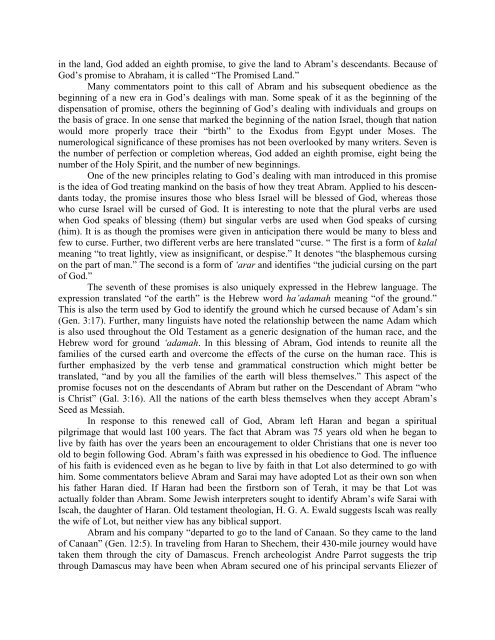A Journey Through The Old Testament - Elmer Towns
A Journey Through The Old Testament - Elmer Towns
A Journey Through The Old Testament - Elmer Towns
Create successful ePaper yourself
Turn your PDF publications into a flip-book with our unique Google optimized e-Paper software.
in the land, God added an eighth promise, to give the land to Abram’s descendants. Because of<br />
God’s promise to Abraham, it is called “<strong>The</strong> Promised Land.”<br />
Many commentators point to this call of Abram and his subsequent obedience as the<br />
beginning of a new era in God’s dealings with man. Some speak of it as the beginning of the<br />
dispensation of promise, others the beginning of God’s dealing with individuals and groups on<br />
the basis of grace. In one sense that marked the beginning of the nation Israel, though that nation<br />
would more properly trace their “birth” to the Exodus from Egypt under Moses. <strong>The</strong><br />
numerological significance of these promises has not been overlooked by many writers. Seven is<br />
the number of perfection or completion whereas, God added an eighth promise, eight being the<br />
number of the Holy Spirit, and the number of new beginnings.<br />
One of the new principles relating to God’s dealing with man introduced in this promise<br />
is the idea of God treating mankind on the basis of how they treat Abram. Applied to his descendants<br />
today, the promise insures those who bless Israel will be blessed of God, whereas those<br />
who curse Israel will be cursed of God. It is interesting to note that the plural verbs are used<br />
when God speaks of blessing (them) but singular verbs are used when God speaks of cursing<br />
(him). It is as though the promises were given in anticipation there would be many to bless and<br />
few to curse. Further, two different verbs are here translated “curse. “ <strong>The</strong> first is a form of kalal<br />
meaning “to treat lightly, view as insignificant, or despise.” It denotes “the blasphemous cursing<br />
on the part of man.” <strong>The</strong> second is a form of ‘arar and identifies “the judicial cursing on the part<br />
of God.”<br />
<strong>The</strong> seventh of these promises is also uniquely expressed in the Hebrew language. <strong>The</strong><br />
expression translated “of the earth” is the Hebrew word ha’adamah meaning “of the ground.”<br />
This is also the term used by God to identify the ground which he cursed because of Adam’s sin<br />
(Gen. 3:17). Further, many linguists have noted the relationship between the name Adam which<br />
is also used throughout the <strong>Old</strong> <strong>Testament</strong> as a generic designation of the human race, and the<br />
Hebrew word for ground ‘adamah. In this blessing of Abram, God intends to reunite all the<br />
families of the cursed earth and overcome the effects of the curse on the human race. This is<br />
further emphasized by the verb tense and grammatical construction which might better be<br />
translated, “and by you all the families of the earth will bless themselves.” This aspect of the<br />
promise focuses not on the descendants of Abram but rather on the Descendant of Abram “who<br />
is Christ” (Gal. 3:16). All the nations of the earth bless themselves when they accept Abram’s<br />
Seed as Messiah.<br />
In response to this renewed call of God, Abram left Haran and began a spiritual<br />
pilgrimage that would last 100 years. <strong>The</strong> fact that Abram was 75 years old when he began to<br />
live by faith has over the years been an encouragement to older Christians that one is never too<br />
old to begin following God. Abram’s faith was expressed in his obedience to God. <strong>The</strong> influence<br />
of his faith is evidenced even as he began to live by faith in that Lot also determined to go with<br />
him. Some commentators believe Abram and Sarai may have adopted Lot as their own son when<br />
his father Haran died. If Haran had been the firstborn son of Terah, it may be that Lot was<br />
actually folder than Abram. Some Jewish interpreters sought to identify Abram’s wife Sarai with<br />
Iscah, the daughter of Haran. <strong>Old</strong> testament theologian, H. G. A. Ewald suggests Iscah was really<br />
the wife of Lot, but neither view has any biblical support.<br />
Abram and his company “departed to go to the land of Canaan. So they came to the land<br />
of Canaan” (Gen. 12:5). In traveling from Haran to Shechem, their 430-mile journey would have<br />
taken them through the city of Damascus. French archeologist Andre Parrot suggests the trip<br />
through Damascus may have been when Abram secured one of his principal servants Eliezer of
















